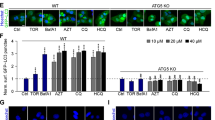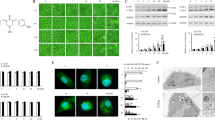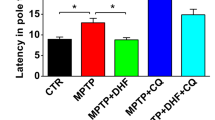Abstract
AtT-20 cells, a mouse pituitary line, externalize a viral membrane glycoprotein and the precursor of ACTH constitutively, that is, rapidly without storage or regulation1. They also have a regulated pathway in which they cleave the precursor to mature hormones, ACTH and β-endorphin2, store them in secretory granules3 and discharge them only in the presence of a secretagogue. An analogy exists for newly synthesized lysosomal enzymes which are either delivered to the lysosome or secreted from the cell4,5. Targeting to the lysosomes may require a low pH step, since chloroquine causes the enzymes to be secreted from the cell5,6. Here we show that chloroquine (200 µM) also appears to block the storage of newly synthesized ACTH in secretory granules and instead diverts it to the outside of the cell via the constitutive pathway. Chloroquine has no effect on the constitutive pathway and does not block the exocytosis of pre-packaged ACTH. Thus like lysosomal enzymes, peptide hormones are not sent to their correct destinations in the presence of chloroquine, but are diverted instead to a constitutive pathway that is chloroquine-insensitive.
This is a preview of subscription content, access via your institution
Access options
Subscribe to this journal
Receive 51 print issues and online access
$199.00 per year
only $3.90 per issue
Buy this article
- Purchase on SpringerLink
- Instant access to full article PDF
Prices may be subject to local taxes which are calculated during checkout
Similar content being viewed by others
References
Gumbiner, B. & Kelly, R. B. Cell 28, 51–59 (1982).
Roberts, J. L., Phillips, M., Rosa, P. A. & Herbert, E. Biochemistry 17, 3609–3618 (1978).
Gumbiner, B. & Kelly, R. B. Proc. natn. Acad. Sci. U.S.A. 78, 318–322 (1981).
Sly, W. S. & Stahl, P. in Transport of Macromolecules in Cellular Systems (ed. Silverstein, S. C.) 229–244 (Dahlem Konferenzen, Berlin, 1978).
Hasilik, A. & Neufeld, E. F. J. biol. Chem. 255, 4937–4945 (1980).
Gonzalez-Noriega, A., Grubb, J. H., Talkad, V. & Sly, W. S. J. Cell Biol. 85, 839–852 (1980).
Mains, R. E. & Eipper, B. A. J. Cell Biol. 89, 21–28 (1981).
Farquhar, M. G. & Palade, G. E. J. Cell Biol. 91, 775–1035 (1981).
Robbins, P. W., Hubbard, S. C., Turco, S. J. & Wirth, D. F. Cell 12, 893–900 (1977).
Phillips, M. A., Budarf, M. L. & Herbert, E. Biochemistry 20, 1666–1675 (1981).
Geisow, M. J. Nature 295, 649–650 (1982).
Tycko, B. & Maxfield, F. R. Cell 28, 643–651 (1982).
Scarpa, A. & Johnson, R. G. J. biol. Chem. 251, 2189–2191 (1976).
Russel, J. T. & Holz, R. W. J. biol. Chem. 256, 5950–5953 (1981).
Loh, Y. P. & Gainer, H. Proc. natn. Acad. Sci U.S.A. 79, 108–112 (1982).
Author information
Authors and Affiliations
Rights and permissions
About this article
Cite this article
Moore, HP., Gumbiner, B. & Kelly, R. Chloroquine diverts ACTH from a regulated to a constitutive secretory pathway in AtT-20 cells. Nature 302, 434–436 (1983). https://doi.org/10.1038/302434a0
Received:
Accepted:
Issue date:
DOI: https://doi.org/10.1038/302434a0
This article is cited by
-
Vti1a/b regulate synaptic vesicle and dense core vesicle secretion via protein sorting at the Golgi
Nature Communications (2018)
-
Role of pGlu-Serpinin, a Novel Chromogranin A-Derived Peptide in Inhibition of Cell Death
Journal of Molecular Neuroscience (2011)
-
Discovery and progress in our understanding of the regulated secretory pathway in neuroendocrine cells
Histochemistry and Cell Biology (2008)
-
Effect of monensin on secretory granules and basal β-endorphin secretion in the melanotroph of the rat pituitary
The Histochemical Journal (1996)
-
Autophagy and other vacuolar protein degradation mechanisms
Experientia (1992)



